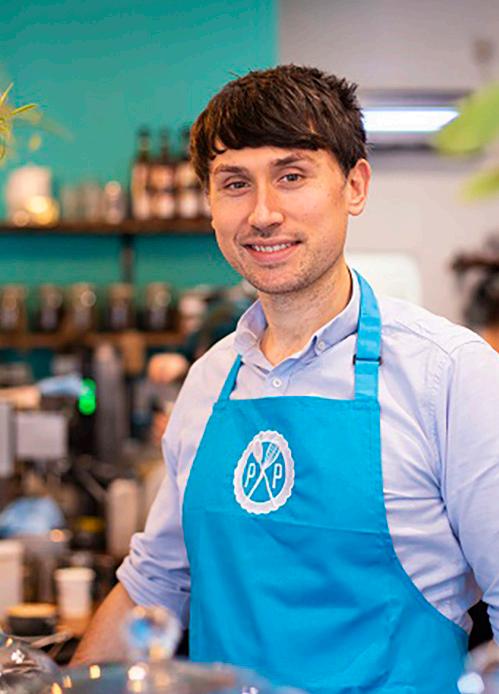
10 minute read
Start-ups in 2020/21
Tribal We take a look at three innovative SMEs and start-ups making the most of opportunities created by the Covid disruption... instincts
While some businesses have been able to innovate, job losses have steered many individuals into entrepreneurship.
Advertisement
A recent report, ‘The Coronavirus Pandemic: A Tinder Box for Creative and Disruptive SMEs and Start-Ups’, assessed the economic impact of the pandemic and demonstrated how SMEs and start-ups were finding new opportunities.
It was published by the Great British Entrepreneur Awards & Community and the business finance marketplace Funding Options.
Responding to pinch-points in UK supply chains, local providers have filled the gap to support vulnerable consumers, it suggested. Coronavirus is “catalysing businesses built on trends which have been accelerated by the outbreak”, indicating growth will continue post-pandemic.
Government support mechanisms, such as the furlough scheme and CBILS have brought “crucial support”; saving jobs and helping businesses navigate this tough economic period.
Francesca James, founder of The Great British Entrepreneur Awards & Community, said: “A positive is that this survey was done prior to the second Lockdown events in the UK. The fact that aJane Crane businesses overwhelmingly launched her ‘messy’ studio-based believed uncertainty would paint-throwing continue into next year therapy experience with a £20,000 loan hopefully suggests preparation and planning for uncertainty over the next 6-12 months.”
Simon Cureton, chief executive of Funding Options, said: “While we are likely to see retrospective reports on the impact of COVID-19 published by the dozen, this one is different because it tells the story from the perspectives of those most impacted by the pandemic – the businesses themselves.
The British Business Bank’s Start-Up Loans programme issued £100 million to more than 8,300 people across the UK between April and the end of the year, helping them to start or scale-up their businesses.
In fact, July hit a new peak as the busiest month since the scheme was founded in 2014, with many of those it supported identifying new trends or demand as a result of the pandemic and taking the opportunity to launch their first enterprise.
Others were forced to adapt to survive during the March and November lockdowns – whether it was moving online for the first time, ramping up a social media presence, or creating a new product altogether.
Jane Crane took out a loan of £20,000 to launch Your Tribe in 2019, a studio-based, paint-throwing therapy experience. As, what she describes as “a messy
Britain’s spirit for new biz
More new businesses were created in one month last year than at any time in the previous 13, according to private equity analysts.
September alone saw 29,008 new businesses registered in the UK, the highest number since October 2007 and the third-highest month since HMRC began keeping records in the late 1980s.
What’s more, new business creation increased month-onmonth throughout the first Lockdown period.
Private equity firm Growthdeck says many people decided to start their own businesses during the Covid period, seeing lockdowns as an opportunity to work on their own ventures that they may have put off previously.
Gary Robins, Head of Business Development, said: “British entrepreneurial spirit has been undeterred, despite the challenges presented by Coronavirus.
“Despite a difficult year, people remained optimistic about starting businesses even in a challenging economy.”
Research earlier this year by Growthdeck found that the e-commerce sector in particular boomed due to the pandemic.
An average of 4,613 online retail businesses were set up per month during the peak months of April, May and June, up 66 per cent from 2,783 on average per month in the previous year.
Growthdeck says that the sudden surge in new business creation is a reminder that the Government should do everything it can to ensure these businesses have access to the investment they need to scale up. n

Gary Robins, Growthdeck

face-to-face experience business”, it wasn’t easy to translate what they do online.
“I developed a guided meditation and couple’s paint pour for people to get messy with at home,” she said. “Going virtual has allowed me to stay in touch with customers and bring a bit of colour to what could be a very gloomy January. Learning to accept the things that are outside my control helped me stay rational.”
Susan Bonnar took out a loan of £12,000 to set up the British Craft House in 2019 – an online marketplace for handmade British crafts. Whilst online stores have prospered during lockdown, there have been plenty of lessons to learn. “I was fortunate to be fully set up online before the pandemic. However, I had to adapt my offerings slightly to ensure we were catering to the new lockdown trends. There was an increased demand for convenient gifts, which were easy to post as people could no longer exchange gifts in person.
“So, in January I launched the ‘Letterbox Gift’ section of the website, featuring a range of artisan items, no larger than an envelope. In the 12 hours following the January lockdown announcement, the website was busy with people buying pocket hugs and motivational gifts to send directly to friends and family.”
Anthony Quinn took out a loan of £10,000 in 2013 to open The Pudding
A Anthony Quinn took a £10,000 loan to fund
The Pudding Pantry in Nottingham. But Lockdown meant launching new products to suit the changing demands of customers
aSusan Bonnar took out a £12,000 loan to
launch the British Craft House, a marketplace for handmade goods which took advantage of her online presence
Pantry, a bakery in Nottingham, which was forced to close temporarily during the first lockdown as cashflow dropped significantly.
“With revenue down, we had to get creative. We developed innovative takeaway menus for Valentine’s and Pancake Day, comprising sumptuous afternoon tea arrays,” he said.
Goji Hair was launched on the back of a £7,400 loan taken by Victoria Griffin of Cardiff. She launched the organic hair salon, during the first Lockdown, selling products usually bought in-store.
“I was surprised at just how busy we were after the first lockdown,” she said. “We were fully booked for eight weeks, a clear indication of how highly clients value their hair.
“I am very grateful that the business is within a sector which seems to bounce back quickly, but the online site has been such a success that we’re likely to keep it running even after lockdown.” n

|YOUNG| |BUCKS| |BUCKING| |THE TREND|
The pandemic appears to have caused a massive surge in young people starting their own businesses, according to a poll of 16-24-year-olds.
Many of them said that a lack of opportunities in the current climate had forced them to strike out alone with one in ten of a 2,502-strong sample actually starting their own business since February 2020.
Researchers say this suggests that, based on the latest ONS population estimates for this age group, more than 630,000 ventures were launched by this Covid Generation since the start of the pandemic.
A further one in five say they have a concrete business idea and are in the process of setting up their own company, indicating that the number of youthful start-ups is expected to increase even further this year.
These research findings suggest that the average age of a UK entrepreneur will drop well below the 40 that Companies House data suggests it was in 2019, according to the Censuswide poll for GoDaddy.
Creative and retail industries appear the most popular sectors for 16-24-year-olds, despite the challenges faced by both industries in the past year.
Nearly a fifth launched a creative business, specialising in art, music or design, which based on those ONS estimates, equates to around 108,000 new companies, closely followed by retail, at 15 per cent with an estimated 95,000.
Researchers believe this relates to the pandemic, which has disrupted the job market and forced many people to take professional opportunities into their own hands.
When asked what encouraged them to launch their own business, three quarters said there were not enough employment opportunities for them in the current climate. In fact, before pursing their own business ideas, almost one in five had tried and failed to find work in their chosen field.
Naturally for Generation Z start-ups, nine in ten placed great importance on

having an online presence and consider having a website, social media channels or e-commerce capabilities to be important for their business.
The research also revealed that they overwhelmingly favour e-commerce and derive 12 per cent more revenue from online sales than the average business owner.
GoDaddy Director Sakshi Anand said: “Young entrepreneurs have managed to make the most out of a difficult situation and have demonstrated the ability to flourish in a challenging economic environment. We’re excited to see what 2021 will bring.”
Ethan Maddison, 23, launched Branded Camera, a London-based content creation agency providing short videos for recruitment companies wanting to advertise online and on social media.
He said: “The past year has been pretty tough work-wise. I graduated from University with the hopes of becoming a sports journalist but, given how tough the job market is right now, I ended up taking a customer service role for a sportswear company.
“It wasn’t my dream job but it paid the bills. Sadly, as a result of the pandemic I was made redundant in September 2020.

CEthan Maddison, Branded Camera
“I considered applying for similar roles again, but after my difficult experience applying for jobs earlier in the year I decided to take the plunge and start my own business. I’ve always been creative, and passionate about media, so that’s where my idea came from.
“In all honestly, I hadn’t really considered the importance of having an online presence when I first came up with the idea. Now I realise how important it really is. With everyone working from home and everyday life being so virtual, it’s crucial that I have a website to act as an online shop-window for potential clients – like an online scrapbook of my work for people to peruse.”
Cleo Morris launched MyDine, a Birmingham-based catering company and at-home meal delivery service, when she was just 23. She cites her adoption of e-commerce as being key to her success since the start of the pandemic.
“I’ve always been entrepreneurial, so when I left university I very quickly made the decision to take matters into my own hands and set up my own business.
“I love being my own boss but it comes with its challenges. When the UK went into Lockdown, the corporate catering side of the business took a serious hit. Fortunately, we were soon inundated with online orders for the at-home delivery service and were able to cater to a nation of home-dwellers, thanks to being set up online.
“Before lockdown, our revenue was split 50/50 between the corporate and at-home offerings. Now we get 90 per cent of our sales from online orders for the at-home service and have actually been able to increase our revenue over the past year.” n



